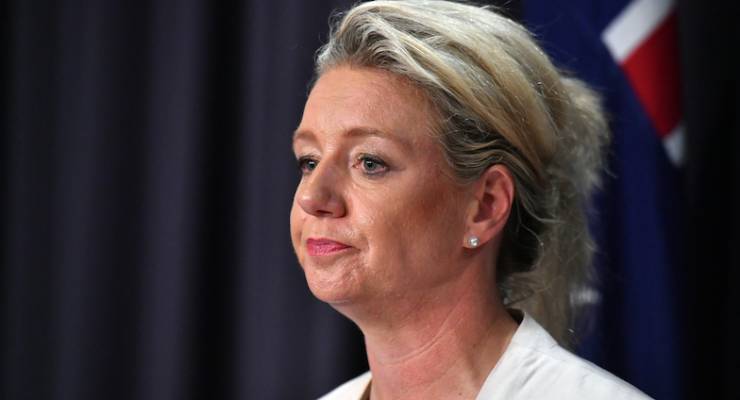
Bridget McKenzie’s diary will presumably record that she lost her ministerial position over failing to declare a measly $180 gift membership to her local gun club on parliament’s register of interests.
That was the reason given by the prime minister, on the basis of (unseen) advice from the head of his department Phil Gaetjens.
For a second, let’s accept this on face value — and put to one side the mountain of evidence compiled by the Australian National Audit Office of systemic rorting by McKenzie’s office of sports grants in the lead up to last year’s federal election.
If we do, then doesn’t it raise another question: is the register of interests fit for purpose?
McKenzie’s complimentary membership to the Wangaratta Clay Target Club, which received one of the grants, was valued below parliament’s gift declaration threshold of $300. Adding it to the register of interests was therefore “unnecessary”, McKenzie’s office said.
On that point, at least, McKenzie is right.
MPs and senators have no obligation to declare gifts valued below $300 (or $750 for gifts from “official sources” such as foreign governments). Although ministers do have a separate obligation to disclose relationships that give rise to a potential conflict of interest, as membership of the gun club later did for McKenzie.
Hence, McKenzie has inadvertently highlighted a significant flaw in Australia’s democratic processes: the register of interests is simply not fit for purpose.
MPs and senators declared more than 4000 gifts throughout the 45th Parliament (2016-2019) — an average of almost 20 items per politician. Yet, because no gifts under $300 needed to be listed, hundreds of freebies — or even thousands — never make it to the register at all.
How many other conflicts of interest are so far undisclosed?
Lowering the threshold at which gifts must be registered would seem to be one way to improve the usefulness of the register of interests. Instead of a registrable threshold of $300, there is no good reason why politicians should not be obliged to declare all gifts above $100, or even $20.
If they don’t think a gift is worth the extra paperwork, they could always just refuse to accept it.
But perhaps a better alternative would be to ban high-value gifts altogether, barring politicians from accepting any gifts worth more than, say, $50.
It is not as radical a suggestion as it may seem.
In the United States, the home of big-money politics, members of the US Congress and Senate can only accept gifts valued up to a maximum of US$50 (A$75) — and they are outright banned from taking gifts from lobbyists.
Closer to home, the Queensland government has strict rules banning ministers from accepting any gifts unless they are “trivial” in nature. Had that rule been in place at a federal level, McKenzie would likely still be a minister.
Many public servants are also prevented from accepting any freebies other than low-value incidentals like a cup of coffee. Politicians may not like being held to the same standards, but they would be hard pushed to make a sensible case against such reforms.
But what’s the problem with politicians accepting gifts anyway? Surely politicians’ views are not influenced by a free ticket to the footy or a case of mid-priced wine? Well, yes, they are.
According to a 2018 report by the Grattan Institute, corporate gifts make preferential treatment more likely, whether the recipient admits it or not.
“We aren’t talking about corruption,” the Grattan Institute’s Danielle Wood said at the time. “There’s no direct payment for a policy decision, it’s more subtle. It’s about building relationships and a sense of reciprocity.”
A single gift may not directly result in funding agreements or a shift in government policy, but clearly corporations wouldn’t spend money on political gifts if they didn’t think it would result in some kind of benefit to their business.
Changing the registrable limits would not completely solve the problem though. Many federal politicians provide entries that are either very vague or very late, undercutting the public value of the register.
Some MPs actively undermine it, like Bob Katter, who outright refuses to disclose his wife’s financial interests. (“My wife has at times bought and sold some investment properties. She regards this as her private business,” Katter states on his form).
Stricter compliance rules would help pull politicians into line, including the creation of a national integrity commission to oversee the conduct of politicians and monitor their entries on the register.
With Scott Morrison previously dismissing such an idea as a “fringe issue”, that seems unlikely to happen any time soon.
At least one of Morrison’s Coalition colleagues should be in favour of such changes though: had Bridget McKenzie been subject to stricter gift rules, she may not have lost her job.








Crikey is committed to hosting lively discussions. Help us keep the conversation useful, interesting and welcoming. We aim to publish comments quickly in the interest of promoting robust conversation, but we’re a small team and we deploy filters to protect against legal risk. Occasionally your comment may be held up while we review, but we’re working as fast as we can to keep the conversation rolling.
The Crikey comment section is members-only content. Please subscribe to leave a comment.
The Crikey comment section is members-only content. Please login to leave a comment.